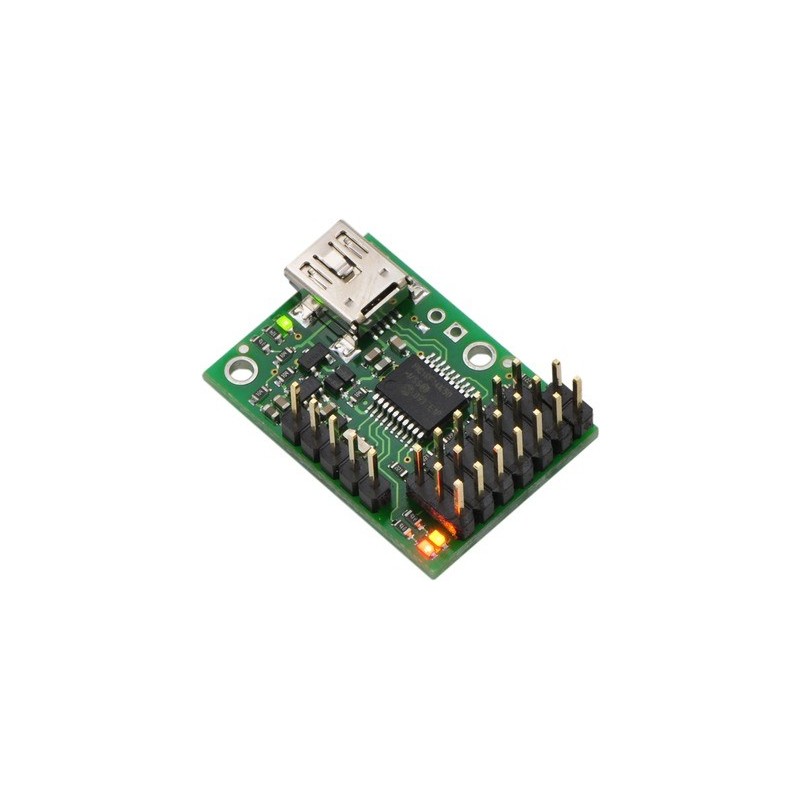



zł87.46 tax excl.
Pololu Micro Maestro 1350 is a compact, versatile servo controller with a USB interface and autonomous operation capability, designed for use in robotics, animatronics, and control systems based on PCs or microcontrollers. Thanks to its flexible channel configuration, it can also be used as a sensor interface and I/O expander.
The Micro Maestro is a 6-channel servo controller from Pololu featuring a USB interface, TTL serial port, and autonomous operation capability thanks to a built-in script interpreter. It allows precise servo control with a 0.25 µs resolution and independent speed and acceleration adjustment for each channel. It can function as an I/O controller – channels can be used as digital outputs or analog inputs, enabling sensor reading and peripheral control without an external microcontroller. Power is supplied via USB or an external 5–16 V source. The assembled version includes pre-soldered goldpin connectors.
Manufacturer BTC Korporacja sp. z o. o. Lwowska 5 05-120 Legionowo Poland sprzedaz@kamami.pl 22 767 36 20
Responsible person BTC Korporacja sp. z o. o. Lwowska 5 05-120 Legionowo Poland sprzedaz@kamami.pl 22 767 36 20
Cable with USB plugs type A and mini-USB type B, cable with a length of 1.8 m
No product available!
Pololu Micro Maestro 1351 in kit version enables precise and flexible control of servos and sensors from a PC or microcontroller. Thanks to its ability to operate autonomously and function as a USB–TTL interface, it is used in motion control systems, animatronic projects, and interactive systems responding to external stimuli.
No product available!
This Kit with fully-dedicated PWM driver chip handles all the motor and speed controls over I2C. Only two data pins (SDA & SCL in addition to the power pins GND & 5V) are required to drive the multiple motors; you can also connect any other I2C devices or shields to the same pins. This makes it drop-in compatible with any Arduino, such as the Uno, Due, Leonardo and Mega R3. Adafruit 1438
The motor driver card can drive 24 servo motors at most. It can be used to drive a multiple-joint robot machine, such as Hexapod Robot, Biped Robot, and Arm Robot. P0288
HAT module with the PCA9685 server driver designed for Raspberry Pi minicomputers. The board is equipped with a 40-pin connector. Adafruit 3416
The servo driver module is an extension intended for minicomputers Raspberry Pi Zero / Zero W / Zero WH / 2B / 3B / 3B +. Allows you to control 16 PWM channels. Waveshare 15275
No product available!
Servo driver based on the Raspberry Pi RP2040 microcontroller. It allows you to control up to 18 servos, has 6 analog inputs and a QW/ST connector for connecting additional sensors. Pimoroni PIM613
Mini Maestro 24 (kit) is a flexible controller for advanced applications with multiple servos, offering sophisticated motion control, signal reading, and autonomous operation capabilities. It is ideal for use in robotics, animatronics, and embedded systems as a precise controller and input/output expander.
No product available!
The SparkFun Continuous Rotation (CR) Servo Trigger is a small robotics board that simplifies the control of hobby RC servo motors. You can use a hobby servo in your projects without having to do any programming! WIG-13872
No product available!
Universal tester of servos and ESC regulators. It allows you to check the operation of the servo without the need for a transmitter and receiver
Compact controller with XIAO ESP32-C3 module, enabling precise control of ST/SC servos via UART interface. Thanks to its solid construction and 5-12 V power supply, it allows simultaneous control of multiple servos, which is suitable for humanoid robots, hexapods and robotic arms. Arduino IDE support, open architecture and easy assembly make it a great tool for education, prototyping and advanced robotic projects. Seeed Studio 114993612
The 8-channel servomechanism controller with potentiometers is a versatile device that allows you to control many servomechanisms at the same time. With a wide voltage range and resistance to extreme temperatures, it is an ideal solution for robotics projects and remote-controlled applications.
An expansion board for the BBC micro:bit, allowing easy connection and control of low-power servos. It supports two servos by default, and up to three by disabling the built-in ZIP LEDs. Powered by three AAA batteries, it simultaneously supplies power to the micro:bit, while a power switch protects against unnecessary discharge. With five RGB ZIP LEDs and the ability to connect additional ones, the board allows for attractive lighting effects and is ideal for robotic projects like the :MOVE mini. Kitronik 5623
Advanced servo controller with UART and USB communication, enabling precise control of multiple servos simultaneously. Compact design and stable power supply via screw connector make the device ideal for integration in robots and automation systems with limited space. Cooperation with the Seeed Studio XIAO ecosystem and the use of serial bus instead of traditional PWM provide efficient, scalable and reliable control in educational, research and DIY projects. Seeed Studio 105990190
With this smart arduino digital servo shield and Dynamixel AX series servos, It\'s quite easy for you to drive multi servos with daisy chain connection with an Arduino board such as Arduino Uno, and build your robotic dog, hexapod with powerful servos. DRI0027
No product available!
No product available!
Adafruit 16-Channel PWM / Servo HAT for Raspberry Pi - Mini Kit (Adafruit 2327)

Pololu Micro Maestro 1350 is a compact, versatile servo controller with a USB interface and autonomous operation capability, designed for use in robotics, animatronics, and control systems based on PCs or microcontrollers. Thanks to its flexible channel configuration, it can also be used as a sensor interface and I/O expander.
